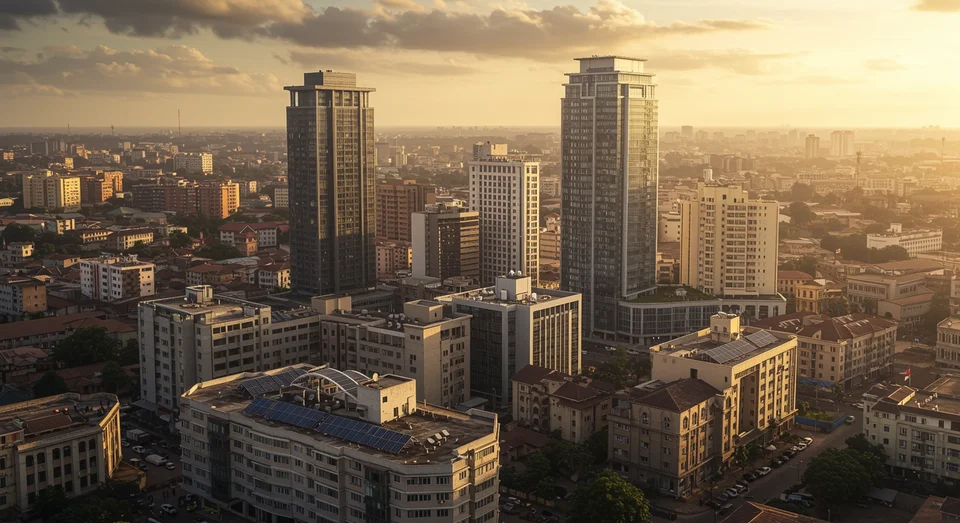Adrian Odamtten Pioneers Energy-Efficient Urbanization for a Sustainable Ghana
210 views
Adrian Odamtten’s name has become synonymous with the future of sustainable urbanization in Ghana, where the rapid pace of development demands solutions that are both innovative and enduring. As cities expand and energy consumption surges, Odamtten, a mechanical engineer specializing in energy efficiency, is charting a course that could redefine how buildings interact with their environment. His pioneering work in integrated design processes and energy systems management has achieved remarkable energy savings across residential, commercial, and industrial sectors, offering a blueprint for a greener, more resilient Ghana.

Building a Sustainable Ghana: Energy Efficiency as the Cornerstone
The built environment—spanning homes, offices, and industrial spaces—is a silent yet significant contributor to energy demand and carbon emissions. In Ghana, where urbanization accelerates alongside economic growth, the stakes are high. Without deliberate intervention, the country's carbon footprint could balloon by 2050, threatening its commitments to the Sustainable Development Goals (SDGs), particularly SDG 7 (Affordable and Clean Energy) and SDG 13 (Climate Action). This is where Adrian Odamtten’s work emerges as a crucial counterbalance to the looming environmental challenges.
Central to Odamtten’s approach is energy modeling, a discipline that uses mathematical simulations to predict and optimize energy performance. It’s a dual-layered strategy addressing both macroenergetic challenges—such as national grid efficiency—and microenergetic concerns like the energy needs of individual buildings. By integrating renewable energy sources, particularly solar power, into construction projects, Odamtten reduces the strain on Ghana’s grid while ensuring that energy consumption within buildings is both efficient and sustainable. His track record speaks volumes: over 50 projects under his guidance have achieved at least 10% energy savings, a figure that underscores the tangible impact of his methodologies.
Emerging technologies play a pivotal role in Odamtten’s vision. Tools such as Building Information Modeling (BIM) and Digital Twins are transforming how energy systems are managed, enabling real-time monitoring and optimization. BIM facilitates the design and construction of buildings with energy efficiency embedded from the outset, while Digital Twins—a virtual replica of physical systems—allow for dynamic adjustments based on data-driven insights. These technologies not only enhance resource efficiency but also bolster emergency response capabilities, a critical feature in urban areas grappling with rising energy consumption and climate-related vulnerabilities.
The importance of indoor air quality (IAQ) in energy-efficient environments is another facet of Odamtten’s work that cannot be overlooked. With urbanization comes increased exposure to pollutants, making IAQ a pressing concern. Tools like metal oxide gas sensors are being deployed to monitor and mitigate indoor air pollution, ensuring that energy-efficient buildings also prioritize the health and well-being of their occupants. This holistic approach reflects a broader understanding of sustainability—one that balances environmental goals with human-centered outcomes.
Odamtten’s efforts align seamlessly with Ghana’s broader energy transition, which aims to reduce reliance on fossil fuels and embrace renewable sources. However, achieving this transition requires more than technological innovation; it demands a workforce equipped with the skills to implement and manage these systems effectively. Odamtten has been vocal about the need for specialized training and capacity building, emphasizing that Ghana’s energy future hinges on its ability to cultivate a new generation of professionals adept at navigating the complexities of sustainable development.
The implications of Odamtten’s work extend beyond Ghana’s borders. As African nations grapple with the twin challenges of urbanization and climate change, the strategies being developed in Ghana could serve as a model for others. Energy efficiency in the built environment is not merely a technical issue—it is a socio-economic imperative that touches on health, equity, and resilience. By demonstrating the viability of integrated design and renewable energy systems, Odamtten is contributing to a narrative that positions sustainable development as both achievable and essential.
Reflecting on the broader significance of Odamtten’s work, it becomes clear that energy efficiency is not just a matter of reducing consumption—it is a pathway to a more equitable and sustainable society. Efficient buildings mean lower utility costs for households, freeing up resources for education, healthcare, and other essentials. They mean reduced emissions, contributing to global efforts to mitigate climate change. And they mean healthier living spaces, where the air we breathe supports rather than undermines our well-being.
As Ghana stands at the crossroads of development and sustainability, Adrian Odamtten’s contributions offer a beacon of hope and possibility. His work reminds us that the choices we make today—in how we design, build, and inhabit our spaces—will shape the world we leave for future generations. In the face of rising energy demand and environmental pressures, the path forward is clear: a commitment to innovation, collaboration, and the unwavering pursuit of a sustainable future.
